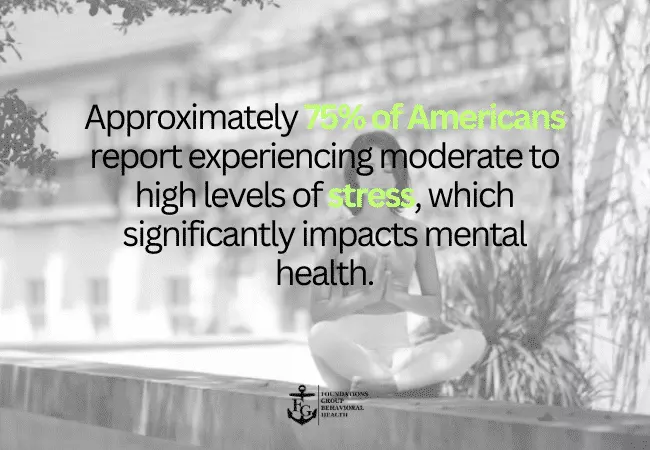Meditation has been a cornerstone of mental well-being practices for centuries, gaining modern recognition for its profound impact on mental health. For individuals dealing with conditions such as anxiety, depression, bipolar disorder, and trauma-related disorders, meditation offers a non-invasive, accessible method to complement evidence-based treatment programs. At Foundations Group Behavioral Health, we integrate meditation into our holistic Mental Health Treatment Programs to promote healing, emotional resilience, and lasting recovery.
The Science Behind Meditation and Mental Health
Meditation is a mental exercise that focuses on training attention and awareness to achieve mental clarity and emotional calm. It’s much more than relaxation—it actively reshapes the brain. Neuroscientific research shows that meditation strengthens the prefrontal cortex (responsible for decision-making and emotional regulation) and reduces activity in the amygdala (the brain’s fear and stress center). These changes can help individuals better manage mental health conditions.
Meditation complements treatments offered in Psychiatric Day Treatment, Half Day Treatment Programs, and Outpatient Mental Health Programs by helping individuals develop healthy coping mechanisms and fostering mindfulness, which is key to reducing stress and emotional overwhelm.
The Proven Mental Health Benefits of Meditation
1. Reduces Stress and Anxiety
Meditation is highly effective in lowering cortisol levels, the hormone associated with stress. By practicing mindfulness, individuals learn to manage their anxiety symptoms by staying present and reframing intrusive thoughts.
- People in Anxiety Treatment Programs report significant reductions in restlessness, fear, and worry with regular meditation.
- A 2019 study in the Journal of Psychiatry found that mindfulness meditation reduces anxiety symptoms by as much as 38%.
2. Alleviates Symptoms of Depression
Meditation encourages individuals to observe their thoughts non-judgmentally, helping them break cycles of negative thinking. This approach can improve emotional stability and resilience for those in Depressive Disorder Treatment Programs.
- Research shows that mindfulness-based cognitive therapy (MBCT), which incorporates meditation, is as effective as antidepressants in preventing relapse in individuals with recurrent depression.
3. Improves Emotional Regulation
Meditation strengthens the brain’s ability to regulate emotions, a key benefit for individuals managing bipolar disorder.
- Those in Bipolar Disorder Treatment Programs often struggle with mood swings; meditation teaches techniques to identify and manage triggers for more balanced emotional responses.
4. Supports Trauma Recovery
For individuals in Trauma Disorder Treatment Programs, meditation provides a way to feel grounded and safe in the present moment, reducing symptoms like hypervigilance and flashbacks.
- Trauma survivors often experience dysregulated nervous systems. Meditation promotes a state of calm by activating the parasympathetic nervous system, the body’s “rest and digest” mode.
5. Manages Co-Occurring Disorders
Meditation is an effective tool for individuals in Co-Occurring Disorder Treatment Programs, addressing both mental health and substance use challenges. It helps reduce cravings, manage stress, and improve emotional resilience, which are critical for long-term recovery.
6. Improves Sleep
Insomnia and sleep disturbances are common in mental health disorders. Meditation helps calm the mind and relax the body, making it easier to fall and stay asleep. This is especially beneficial for individuals in all levels of care, including Half Day Treatment Programs and Outpatient Mental Health Programs.
Types of Meditation Used in Mental Health Treatment
Meditation is not a one-size-fits-all solution. Different techniques can be tailored to meet the unique needs of individuals receiving care at a Behavioral Health Treatment Center in Massachusetts.
1. Mindfulness Meditation
- Focuses on staying present and observing thoughts without judgment.
- Ideal for managing anxiety, depression, and trauma-related symptoms.
2. Loving-Kindness Meditation (Metta)
- Involves cultivating compassion, kindness, and empathy toward oneself and others.
- Helps reduce feelings of loneliness and improve relationships.
3. Body Scan Meditation
- Guides attention through different parts of the body, promoting awareness and relaxation.
- Effective for individuals recovering from trauma or chronic stress.
4. Transcendental Meditation (TM)
- A mantra-based practice that promotes deep relaxation and stress reduction.
- Often used to combat anxiety and improve focus.
5. Breathing Exercises
- Simple yet powerful techniques to calm the nervous system and ground the individual in the moment.
- Useful in reducing panic attacks and high-stress episodes.
How Meditation Fits into Evidence-Based Therapies
Meditation seamlessly complements evidence-based therapies such as Cognitive Behavioral Therapy (CBT) and Dialectical Behavior Therapy (DBT), enhancing their effectiveness in treating mental health disorders. These therapeutic approaches aim to change harmful thought patterns and behaviors, and meditation provides the mindfulness and self-awareness needed to achieve these goals.
- Cognitive Behavioral Therapy (CBT):
Meditation helps individuals become more aware of their automatic thoughts and emotions, a core component of CBT. Mindfulness meditation trains the brain to observe thoughts without judgment, enabling individuals to challenge negative thinking patterns more effectively during therapy sessions. - Dialectical Behavior Therapy (DBT):
DBT emphasizes mindfulness as one of its foundational skills for emotional regulation. Meditation practices, such as focusing on the present moment, help individuals manage distress, reduce impulsivity, and improve interpersonal relationships. - Trauma-Focused Therapies:
For trauma survivors, meditation fosters a sense of safety and grounding, allowing them to process their experiences without being overwhelmed. It can be used alongside Eye Movement Desensitization and Reprocessing (EMDR) therapy to enhance emotional stability.
By integrating meditation into these therapies, individuals not only gain tools to manage their symptoms but also build long-lasting skills for maintaining emotional balance.

Common Misconceptions About Meditation and Mental Health
Despite its growing popularity, meditation is often misunderstood. Addressing these misconceptions can help individuals embrace it as part of their mental health journey.
- Misconception: “Meditation is only for relaxation.”
- Reality: While relaxation is a benefit, meditation’s primary purpose is to cultivate mindfulness and awareness. It actively rewires the brain to improve focus, emotional regulation, and resilience.
- Misconception: “You need to clear your mind completely to meditate.”
- Reality: Meditation isn’t about emptying your mind but rather observing thoughts without judgment. It’s about learning to respond thoughtfully instead of reacting impulsively.
- Misconception: “Meditation works immediately.”
- Reality: Like any skill, meditation requires consistent practice to experience its full benefits. Results may take weeks or months to become noticeable.
- Misconception: “Meditation is only for spiritual people.”
- Reality: Meditation is a practical mental exercise backed by science. It’s used in clinical settings to treat anxiety, depression, trauma, and more, regardless of one’s spiritual beliefs.
- Misconception: “Meditation is a replacement for therapy or medication.”
- Reality: Meditation is a complementary practice that works best alongside evidence-based therapies and, if needed, medication.
Challenges in Meditation and How to Overcome Them
Starting and maintaining a meditation practice can be challenging, especially for individuals dealing with mental health conditions. Here’s how to address common obstacles:
- Challenge: Difficulty Focusing
- Solution: Start with short sessions (2–5 minutes) and gradually increase the duration. Guided meditations can also provide structure and focus for beginners.
- Challenge: Impatience or Frustration
- Solution: Approach meditation with curiosity rather than expectation. Remind yourself that progress is gradual and there’s no “right” way to meditate.
- Challenge: Discomfort or Restlessness
- Solution: Experiment with different positions, such as sitting in a chair or lying down. Incorporating gentle movements like yoga or stretching before meditation can help.
- Challenge: Overwhelming Emotions
- Solution: Focus on grounding techniques, such as breathing exercises or body scan meditations. If strong emotions persist, discuss them with a therapist who can help you process them.
- Challenge: Staying Consistent
- Solution: Set a specific time each day for meditation, even if it’s only a few minutes. Use reminders or apps to help build the habit.
Incorporating Meditation Into Mental Health Treatment Programs
At Foundations Group Behavioral Health, meditation is seamlessly integrated into our treatment programs to provide a comprehensive and personalized approach to care.
In Our Programs:
- Psychiatric Day Treatment:
- Daily meditation sessions help patients regulate emotions and manage stress as they undergo intensive therapy.
- Half Day Treatment Program:
- Focused mindfulness workshops empower patients with tools to handle life’s challenges between therapy sessions.
- Outpatient Mental Health Programs:
- Meditation is included as a coping strategy that patients can use independently to maintain emotional balance.
- Specialized Treatment Programs:
- Anxiety Treatment Programs: Meditation is used to manage intrusive thoughts and foster calm.
- Depressive Disorder Treatment Programs: Mindfulness is combined with therapy to reduce negative thought patterns.
- Bipolar Disorder Treatment Programs: Meditation helps stabilize mood swings and improve self-awareness.
- Trauma Disorder Treatment Programs: Meditation is a grounding technique to help individuals process traumatic experiences safely.
Meditation Tools for Different Mental Health Disorders
Different mental health conditions benefit from specific types of meditation practices. Here’s how tailored approaches can address unique challenges:
| Condition | Meditation Practice | How It Helps |
|---|---|---|
| Anxiety | Mindfulness Breathing | Reduces racing thoughts and promotes a sense of calm. |
| Depression | Loving-Kindness Meditation | Encourages self-compassion and reduces feelings of worthlessness. |
| Bipolar Disorder | Emotional Awareness Practice | Helps identify triggers and manage mood fluctuations. |
| Trauma/PTSD | Body Scan Meditation | Grounds individuals in the present moment and reduces hypervigilance. |
| Co-Occurring Disorders | Guided Visualization | Combines stress relief with positive imagery, supporting recovery from addiction. |
| General Stress | Transcendental Meditation (TM) | Promotes deep relaxation and stress reduction. |
Why Meditation Works for Mental Health
- Brain Plasticity:
Meditation increases gray matter density in regions of the brain responsible for learning, memory, and emotional regulation. - Non-Invasive and Accessible:
Meditation is a natural practice that requires no special equipment and can be easily incorporated into daily routines. - Supports Long-Term Recovery:
Unlike quick fixes, meditation fosters lasting changes in the way individuals respond to stress and emotions, making it a valuable tool for long-term mental health. - Improves Overall Quality of Life:
Beyond symptom management, meditation enhances self-awareness, inner peace, and resilience, leading to a more fulfilling life.
Start Your Journey at Foundations Group Behavioral Health
At Foundations Group Behavioral Health, we take a holistic approach to mental health treatment, incorporating mindfulness and meditation into all levels of care. As a leading Behavioral Health Treatment Center in Massachusetts, we offer:
- Anxiety Treatment Programs
- Depressive Disorder Treatment Programs
- Bipolar Disorder Treatment Programs
- Trauma Disorder Treatment Programs
- Co-Occurring Disorder Treatment Programs
Our compassionate team helps individuals cultivate the skills needed to manage symptoms, build resilience, and thrive beyond treatment.
Final Thoughts
Meditation is a powerful tool for enhancing mental health and well-being. Whether used to manage anxiety, stabilize mood swings, or support trauma recovery, meditation complements traditional treatments to provide a holistic approach to care.
If you or a loved one is ready to explore the benefits of meditation within a structured mental health treatment program, contact Foundations Group Behavioral Health today. Together, we can help you achieve a healthier, more balanced life. Contact us today at 508.388.5324 to book your first session and begin your journey toward a more mindful future.
FAQ on Meditation and Mental Health Benefits
How does meditation benefit mental health?
Meditation helps reduce stress, manage symptoms of anxiety and depression, improve emotional regulation, and enhance overall well-being. It complements treatments like CBT, DBT, and trauma-focused therapies.
Can meditation be used alongside traditional mental health treatments?
Yes, meditation is a powerful complement to therapies offered in Mental Health Treatment Programs, such as Psychiatric Day Treatment and Outpatient Mental Health Programs.
What types of meditation are best for mental health?
Different practices work for different needs. For example, mindfulness meditation is great for anxiety, while body scan meditation is beneficial for trauma recovery.
Is meditation effective for severe mental health conditions?
While meditation can support individuals with severe conditions like bipolar disorder or PTSD, it works best when combined with professional treatment, such as a Bipolar Disorder Treatment Program or Trauma Disorder Treatment Program.
How can beginners start meditating for mental health?
Begin with short sessions (2–5 minutes), use guided meditations, and choose a quiet, comfortable space. Apps like Calm or Headspace can also help.








